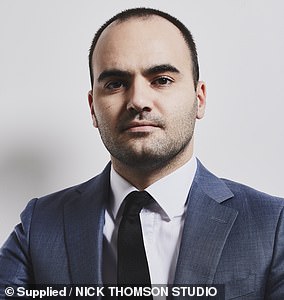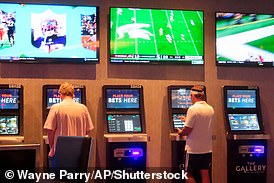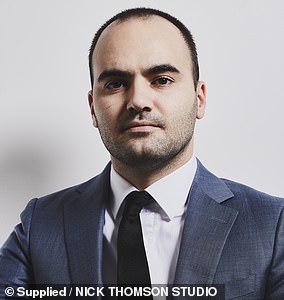Americans have lost a shocking $245billion on sports betting since the Supreme Court loosened restrictions on the industry in 2018, with experts fearing that gambling addiction has gripped the nation.
Gamblers used to be forced to travel to casinos Nevada, which was exempt from a national gambling ban, along with Delaware, Oregon and Montana.
But since the 1992 ban was lifted, the industry has become a high- growth tech business that saw more than $12billion in revenue in just 2022.
Sports betting is now legal, typically for adults aged 21 and over, in 34 states and Washing D.C. – and in 25 jurisdictions in the US gamblers can bet online. The industry has generated more than $3.4billion in tax revenue.
The U.S. has overtaken the U.K as the biggest regulated online gambling market in the world, and as the industry continues to grow, concerns are rising that addition to sports gambling could become a national crisis.
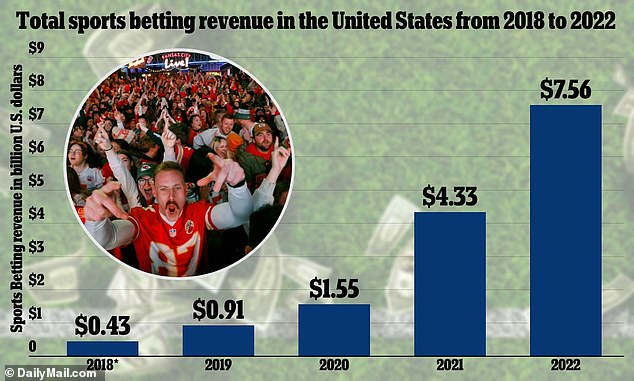
Americans have lost a shocking $245billion on sports betting since the Supreme Court loosened restrictions on the industry in 2018
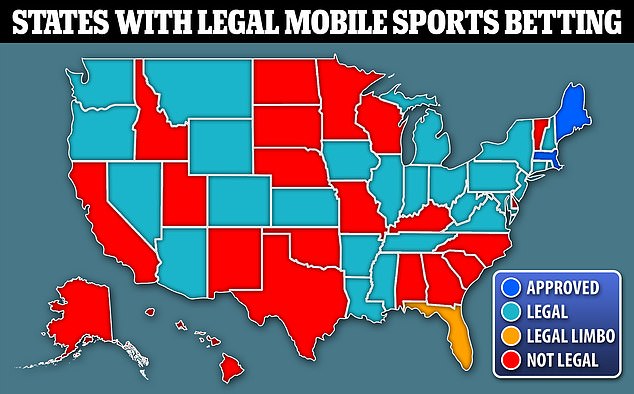
Since the Professional and Amateur Sports Protection Act was struck down, 36 states and Washington DC have legalized sports betting, typically for adults aged 21 and over
The National Council on Problem Gambling’s helpline has seen its traffic increase by 21 percent when compared to last year, receiving more than 30,000 calls and texts in March, as reported by the Financial Times.
An alarming study conducted by New Jersey’s attorney general found that 6 percent of people surveyed in the state are problem gamblers and up to 20 per cent of citizens exhibit signs of problematic play.
The state was the first to approve sports betting and online gaming.
In Pennsylvania, researchers found that 36.7 percent of online gamblers admitted to observing at least one problematic element to their gambling habit in 2022.
The nation’s gambling industry is not currently subject to federal oversight. Instead, individual states oversee it – and consumer protections are low or nonexistent.
Twenty of the nation’s jurisdictions with regulated online sports betting don’t even have restrictions on betting with a credit card. Three of them don’t require operators to provide a tool for gamblers to self-limit depots or wager amounts or time spent gambling.
A Supreme Court decision in 2018 opened the door to legalizing the billions of dollars that Americans wagered illegally on professional and amateur sports each year — often through illicit bookies or offshore gambling houses.
Now, folks in states with legalized sports betting can try their luck with Caesars, WynnBET, BetRivers, DraftKings and other big sportsbooks that advertise prominently at games, on television and — controversially — on college campuses.
A 2021 study by the National Council on Problem Gambling (NCPG) showed that some 25.5 million adults had taken up sports and internet gambling since the law changed in 2018.
Legislators in at least nine states have moved to pass bills aimed at regulating the industry. They have offered measures such as cracking down on partnerships between colleges and betting companies.
DraftKings has been fined half a million dollars by Ohio regulators for their aggressive promotional strategies, which included describing bets as ‘risk-free’ and advertising to people under 21.
Caesars, BetMGM, DraftKings and FanDuel dominate the online casino and sports betting market.
This year’s record-setting 50.4 million Super Bowl bettors surpasses the 31.4 million Americans who wagered some $7.61 billion on last year’s clash between the Los Angeles Rams and the Cincinnati Bengals.
NCPG data suggest 6-8 million Americans have a gambling problem, which costs taxpayers $7 billion each year from the resulting bankruptcies, healthcare and criminal justice costs.
Former addicts and researchers say sports betting firms often target college students as they lure new users to cell phone betting apps that then hook them on roulette, slots, and other compulsive games.
‘Anything you stick on a phone that lets people drain their bank account in one evening is a bad idea,’ said Brian Hatch, 40, a recovered gambling addict based in Connecticut. ‘I think it’ll be the next opioid crisis.’
This year’s record-setting 50.4 million Super Bowl bettors surpasses the 31.4 million Americans who wagered some $7.61 billion on last year’s clash between the Los Angeles Rams and the Cincinnati Bengals.
Matt Zarb-Cousin, a recovered addict and entrepreneur, told DailyMail.com lower caps on the amount of money gamblers can lose in a session would help.
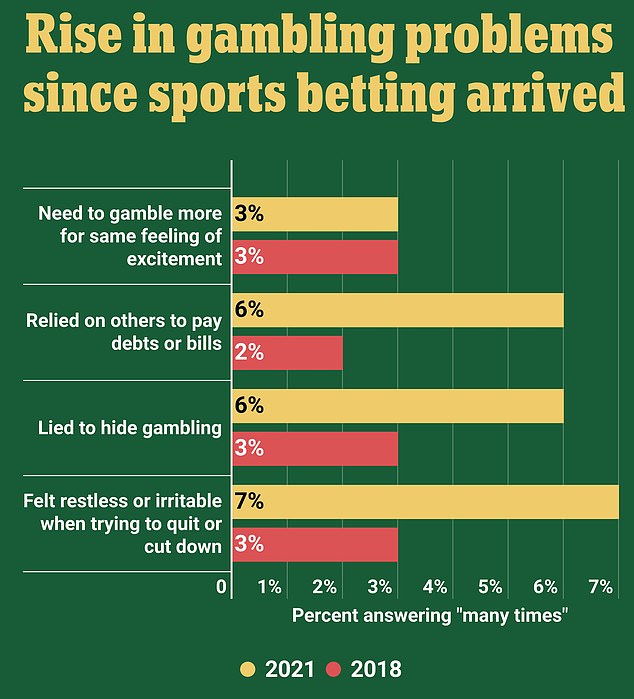
A 2021 study by the National Council on Problem Gambling showed that, since the law changed in 2018, the number of gamblers who lied about their addiction or felt restless or irritable when they were not having a flutter rose sharply
Brian Hatch, a recovered gambling addict based in Connecticut, urged regulators to protect cash-strapped gamblers, crack down on advertising, and curtail gambling on credit cards and direct money transfers from users’ banks to online casinos.
‘Anything you stick on a phone that lets people drain their bank account in one evening is a bad idea,’ he said.
